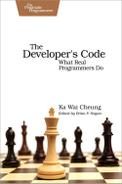| Essay 23 | Create “Off-Time” with Your Team |
Productivity can happen only when there’s time allowed to be productive. That’s less obvious than it sounds. Basic events in everyday work—meetings, phone calls, shoulder tapping—are so commonplace now that we forget these are all distractions.
How have some companies solved the distraction issue?
37signals preaches a philosophy of staying away from their employees. In Rework [FH10], they mention how interruption not only stops us from working on the thing we’re working on but breaks us out of our natural “alone zone”—that state of completely concentrating on our work.
Google is well known for its “20 percent rule,” which allows engineers one day a week to work exclusively on a company-related project they’re particularly passionate about.[8] Many of these side projects turned into some of Google’s best known products, like Google News and Gmail.
Companies that want their employees to thrive, not just survive, need ways of allowing that to actually happen.
If I had my druthers, I’d work from home every day. Extracting myself from the nagging feeling that there’s a client call looming or that someone needs my help on something right now is a huge burden lifted. I can just focus on my code all day.
But we also serve clients who sometimes need lots of attention. We rarely have the luxury of spending full days on pure programming. There will always be fires to fight, clients to call, and emails to answer.
Welcome, Off-Time
A few years ago, I instated off-time at my company. It’s a way of mimicking the get-out-of-my-face-and-just-let-me-work rules that other companies implement, while still catering to our clients’ needs (aka calls, emails, and general attentiveness). Here’s how it works.
We have two-hour shifts of off-time for each developer, every day. When you’re on off-time...
-
No emails need to be answered.
-
No meetings. You are unavailable during this time.
-
No phone calls.
-
No co-worker instant messages you.
-
No co-worker talks to you.
During off-time, we place a white flag on our desks. After two hours off, we go back to checking email and responding to phone calls and instant messages. Then, we proceed as normal. The golden rule is simple: don’t bug the person on off-time.
It would be great to have company-wide off-time, but it’s unreasonable for our business. It means we would essentially shut down from any client or internal communication for two hours. That’s just too long for some of our clients, especially when we’re in the midst of a release.
We remedy this by setting up staggered shifts. They look something like this:
-
Shift 1: 10 a.m. to noon daily—Ka Wai, Michael
-
Shift 2: 2 p.m. to 4 p.m. daily—Anthony, Mustafa
-
Shift 3: 4 p.m. to 6 p.m. daily—Tom, Craig
Because shifts are staggered, only one or two people are off at any given time. The company doesn’t just shut down; for the most part, we’re available.
Someone Else Can Help You
For us, who goes on off-time isn’t random. We pair up members in generally different roles for each off-time shift. I tend to work closest with Mustafa, Tom with Mike, and Anthony with Craig. So, we don’t share the same off-time.
That means if there’s an urgent issue, a natural counterpart is available to discuss it. If Craig has a question for me at 11:30 a.m., he can ask Mustafa instead. If I have a question for Tom at 4:30 p.m., I can ask Michael. If a client sets up a phone meeting for someone during his off-time, there’s a natural counterpart who will be available at that time instead.
Interruption as the Last Resort
Since off-time cuts us off from the person on it, it also makes everyone think harder about their own problems. We’re more prone to ask, “Is this something I can solve with a little Googling instead of bothering someone?” Interruption is the last resort.
Off-time gives each of us ten hours of interruption-free time a week, with almost no disruption to our availability to clients and ourselves. It’s a great way to sustain productivity in a realistic way.
So, whether it’s off-time, a free day to do your own thing, or staying physically away from each other, think of how you can make yourself more productive by leaving one another alone.
